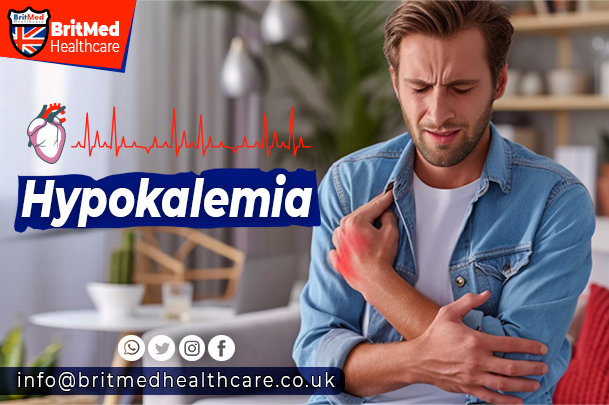Hypokalemia: A Critical Condition Requiring Prompt Attention
Hypokalemia, a condition characterized by abnormally low levels of potassium in the blood, is a significant medical concern that demands prompt attention. As a vital electrolyte, potassium plays a crucial role in maintaining the body’s physiological functions, including regulating heart rhythm, muscle contractions, and nerve impulses. In this article, we will delve into the causes, symptoms, diagnosis, treatment, and prevention of hypokalemia, with a focus on its significance in British medical practice.
Causes of Hypokalemia
Hypokalemia can arise from a variety of causes, including:
- Dehydration: Prolonged diarrhea, vomiting, or excessive sweating can lead to dehydration, which may result in potassium depletion.
- Diuretic therapy: The use of diuretic medications, such as furosemide and thiazides, can increase potassium excretion in the urine.
- Malnutrition: Deficiencies in potassium-rich foods or inadequate nutrition can contribute to hypokalemia.
- Gastrointestinal disorders: Conditions such as Crohn’s disease, ulcerative colitis, and gastrointestinal surgery can impede potassium absorption.
- Renal impairment: Kidney damage or failure can reduce the body’s ability to excrete excess potassium.
Symptoms of Hypokalemia
The symptoms of hypokalemia may vary in severity and may include:
- Muscle weakness: Fatigue, weakness, and cramping of the muscles are common symptoms.
- Abnormal heart rhythms: Hypokalemia can disrupt heart rhythm, leading to palpitations, arrhythmias, or even cardiac arrest.
- Fatigue: Generalized fatigue and lethargy are common complaints.
- Constipation: Hypokalemia can cause constipation due to impaired muscle function.
- Muscle cramps: Severe muscle cramps can occur due to potassium deficiency.
Diagnosis of Hypokalemia
Diagnosis of hypokalemia typically involves:
- Blood tests: Measuring serum potassium levels (normal range: 3.5-5.5 mmol/L) to confirm the diagnosis.
- Electrocardiogram (ECG): An ECG may be performed to assess heart rhythm and identify any abnormalities.
- Physical examination: A thorough physical examination is necessary to identify signs of muscle weakness or other symptoms.
Treatment of Hypokalemia
Treatment for hypokalemia involves:
- Oral supplementation: Potassium-rich foods or supplements (e.g., bananas, avocados, or potassium gluconate) may be recommended.
- Parenteral administration: In severe cases, intravenous potassium chloride may be necessary to rapidly correct potassium levels.
- Addressing underlying causes: Treatment of underlying conditions, such as dehydration or gastrointestinal disorders, is essential.
Prevention of Hypokalemia
Prevention strategies include:
- Maintaining adequate hydration: Drinking plenty of water and avoiding dehydration.
- Balanced diet: Consuming a balanced diet rich in potassium-rich foods.
- Monitoring medication use: Regularly monitoring medication use and adjusting dosages as necessary.
- Addressing underlying conditions: Prompt treatment of underlying conditions can help prevent hypokalemia.
Conclusion
In conclusion, hypokalemia is a critical condition that requires prompt attention and management. Healthcare professionals must be aware of the causes, symptoms, diagnosis, treatment, and prevention strategies for hypokalemia to ensure timely and effective interventions. By adopting a comprehensive approach to managing this condition, healthcare providers can significantly reduce the risk of complications and improve patient outcomes in British medical practice.
References:
https://www.ncbi.nlm.nih.gov/books/NBK482465/
https://my.clevelandclinic.org/health/diseases/17740-low-potassium-levels-in-your-blood-hypokalemia
https://emedicine.medscape.com/article/242008-overview
Websites:
Britmed Healthcare: https://britmedhealthcare.co.uk/
Nightingale Hospital: https://www.nightingalehospital.co.uk/
You can also book on Top Doctors UK Contact us on WhatsApp 08009708017
Top Doctors: https://www.topdoctors.co.uk/doctor/ahmed-el-missiry




